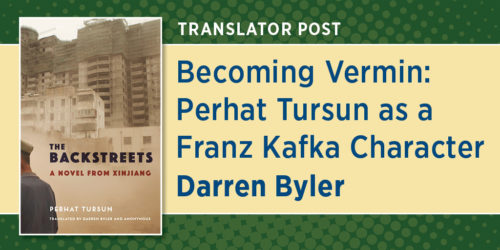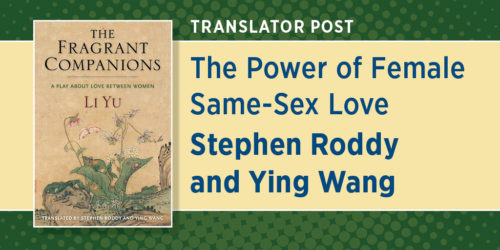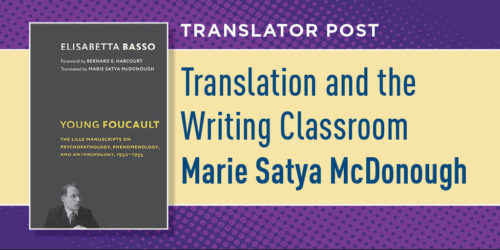Q&A: Eva von Redecker and Lucy Duggan on Praxis and Revolution

The concept of revolution marks the ultimate horizon of modern politics. In Praxis and Revolution: A Theory of Social Transformation, Eva von Redecker reconsiders critical theory’s understanding of radical change in order to offer a bold account of how revolution occurs. In celebration of Women in Translation Month, von Redecker and translator Lucy Duggan have a lively conversation about Redecker’s inspiration and thought process in writing this book, as well as Duggan’s crucial role in this English-language translation.
Lucy Duggan: Hello, Eva! I was thinking that we could start our conversation from Wendy Brown’s description of Praxis and Revolution as a “wild dinner party of a political theory book” and discuss the dinner party in more detail. For me, this framing connects with the fact that you say in your preface to the English-language? edition that your approach is not a model of “agonistic politics,” and that transformation happens though “contamination and refunctioning” rather than in confrontation. A wild dinner party sounds to me like a potential space for “contamination”—for people to observe each other, interrupt each other, irritate each other, indulge in messiness, and draw new conclusions. Does this comparison chime with your approach to making theory?
Eva von Redecker: Yes, absolutely, let’s start with the dinner party! As an author, I love to think of my work as that of a hostess. My style in general, and definitely in Praxis and Revolution, is what the Romanticists would call “synthetic thinking.” There are obviously a lot of hair-splitting distinctions drawn throughout the text, but the fundamental intent is to bring stuff together. It’s what we do in revolution, too, isn’t it? Assembling people in the street—just like actual dinner parties—has certainly become more precarious since the start of the pandemic. But at heart, the task of social transformation is one of assembly, of assembling the habits and relations that might make up a new form of life. I focus on that task of world-building rather than agonism because I consider revolutions not just terminations of the old, but as creations of something new.
Lucy Duggan: Something I really enjoyed about translating the book was the mix of styles and registers which comes from this assembly of people. You bring together fictional characters from Mary Wollstonecraft’s Jemima, who works as a laundress and then as a guard in a mental institution, to Bryan Landry’s drag alter-ego Marta, an ACT UP activist. These examples from literature and film enable the reader to understand how revolutions develop in interstitial spaces, and thus they help to translate the words of the more theoretical guests at the dinner party, such as the historian Lynn Hunt and the critical theorist Judith Butler. I came to see that writing theory already involves multiple acts of translation. Do you recall points in the book that were challenging for you as a hostess—that is, where this translation was difficult to achieve? Or, conversely, do you have favorite guests who played a key role in the process of creating something new?
Eva von Redecker: It is so amazing how all those figures are so vivid in your mind still. I think it shows your novelist’s imagination, to detect this cast of characters and how they animate the text. I wonder where exactly the translation comes in. I think the craft as hostess is to arrange people such that exciting conversations can happen. To translate between people, sometimes directly, sometimes by placing a suitable other person in the middle. One place in the text where that worked in a way I found satisfying is that of the theory of performativity, i.e., Judith Butler. I have this rather long and detailed account of Anthony Giddens’s social theory. He certainly wasn’t my first pick as “guest.” But he has a lasting influence, also via William R. Sewell, and I needed to deal with that. But the more I wrote about him, the clearer it became that the idea of performativity was absolutely essential to make Giddens’s social theory consistent. So we turn to Judith Butler. But I took great care not to have her in the text as a solitaire. Working through my ACT UP example, I came across a lot of late 1980s gay theorizing about parody and subversion, so that is also there, a whole queer affinity group. And by forming those arrangements, it is not just translation that happens, but also, again, assembly—and back-up. If translating and hosting coincide, it underlines how much you as a translator co-create the text. You host the American party, you know? Did it actually feel that way in translating, that there was this multiplicity of voices—more symposium than single treatise?
Lucy Duggan: Yes, it absolutely did. At the level of language, it was just great fun to translate a theory text which included phrases like “she swoons in Jemima’s arms” and my favorite account of a villainous bourgeois husband: “deeply in debt and yet addicted to spending, with a hot temper and a weak character, promiscuous and unromantic.” It’s exciting to move between dramatic interpretations of literary texts and rigorous discussions of praxis theory and find out how these are interwoven, as well as to see how you bring seemingly disparate theorists together. There’s a famous anecdote about a dinner party to which Charlotte Brontë was invited by her fellow author William Makepeace Thackeray, with the expectation of “brilliant conversation”—“which never began at all”: Brontë was almost silent, although she apparently talked quietly to the Thackeray daughters’ governess. When translating your book, I felt that you let us hear what Brontë might have been saying to the governess, that you created spaces for conversations that otherwise wouldn’t be audible, or had previously been truncated or overlooked, such as Margaret Masterman’s nuanced reworking of Thomas S. Kuhn’s approach to paradigm shifts. Looking back at this book, are there authors who have since become important to you, whom you’d like to bring into the symposium?
Eva von Redecker: Oh, that is such a beautiful story, thank you! And indeed, it captures well this shift in focus in what is intelligible and central that I try to convey in the book. I do it in the abstract register of theory—finding terms that open a space for the oblique that will figure as new to many but not all. And I also do it with those literary examples. In a way, they stand in for the real revolutionary praxis by filling the interstitial spaces with life. Harking back to Brontë and the governess, any fully emancipatory praxis at present would of course also have to ask: What conversations did the kitchen staff have? And that sugar in their tea, where did it grow and who was it harvested by? As you know, in my current work I think a lot about how various modern forms of oppression rest on propertization: turning something that is alive into an object of domination. In a way, I’m trying to spell out what paradigm (following Masterman’s usage of that term as a concrete model) it actually is that we would need to revolutionize against. Reading decolonial thinkers like Rita Segato, who talks about the conquestiality of power as “dueñidad” as establishing mandates of ownership, or following Saidiya Hartman’s intricate analyses of the afterlife of property, I keep stumbling over the fact that these authors also propose interstitial accounts of transformation. And I feel that I could have written a better book had I been less ignorant at the time of writing. But that is a hopeful thing. Others will make the theory better and I am very curious about that.
Read the source information about Charlotte Brontë and William Makepeace Thackeray.
Categories:Author InterviewNational Translation MonthPhilosophySociety for Phenomenology and Existential PhilosophyTranslationTranslator InterviewTranslator PostWomen in Translation
Tags:Eva von RedeckerFrench RevolutionLucy DugganNational Translation Month 2022Praxis and RevolutionWITMonth2022








